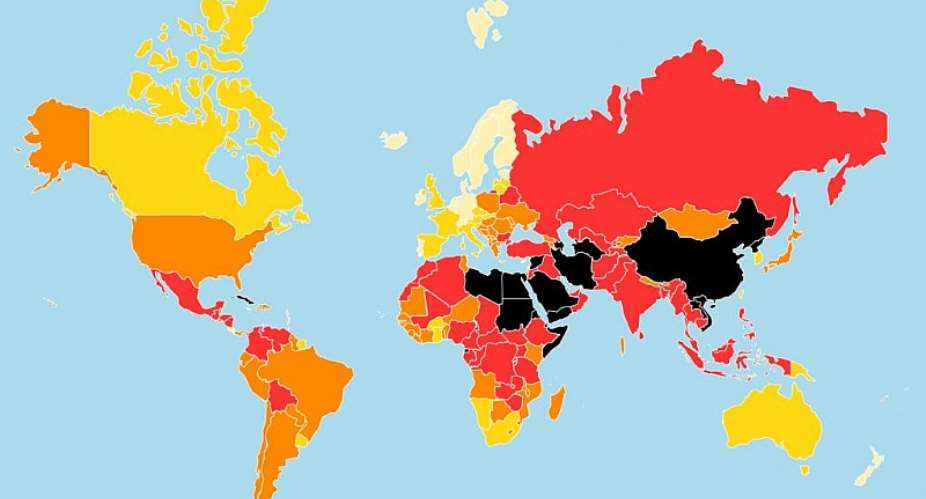African leaders have switched tactics to prevent news from circulating by putting economic pressure on journalists, usually through an exorbitant tax or inflated media accreditation charges, according to media watchdog Reporters Without Borders' 2019 report on press freedom in sub-Saharan Africa.
“Political leaders are being quite innovative and creative to silence the media,” says Arnaud Froger, RSF's Africa director. “Usually, they go for intimidation, aggression, or media suspension, but more and more we are witnessing a wide range of economic pressure,” he says, speaking to RFI from Dakar, Senegal.
In Tanzania, President John Magufuli passed a law requiring media houses, bloggers and journalists who operate online to pay a $900 US fee to register a blog or news site, a steep price for many Tanzanians.
Tanzania also expelled two press freedom defenders last year who were there to assess the media.
“The media is regularly suspended, and there's hate speech from authorities against journalists as well,” says Froger. “It's a worrying situation, especially because Tanzania was doing rather well,” he says.
In neighbouring Uganda, President Yoweri Museveni has imposed a daily tax on users of online social networks and messaging services, which he says is an effort to curb gossip.
According to RSF, Mozambique is considering the most prohibitive media accreditation, and would charge several thousand US dollars to film in the country or to be based there as a foreign correspondent.
Political changes
While the decline of press freedom in the sub-Saharan African region is not as steep in 2019 as in the rest of the world, 22 out of the 48 countries are in the red or black zone, meaning that the situation is 'bad' or 'very bad'.
Some 22 countries have also had social media destruction and internet shutdowns over the past five years, which is a worrisome tendency, according to Froger.
“Most of this disruption came from political leaders who were in office more than 13 years,” he says.
However, RSF notes some progress. This year's report highlights the fact that political change has a direct impact on press freedom.
“In Ethiopia, the changes are spectacular,” says Froger, noting that this happened after Prime Minister Abiy Ahmed came to power. “There is no journalist in jail in Ethiopia any more. It's the first time in more than a decade,” he says.
Many media workers returned to Ethiopia after being in exile to work as journalists, and media houses that were banned under the old regime are now operating again, says Froger.
Gambia has also been party to significant progress -- the country jumped 30 places to 92nd position since Yahya Jammeh left at the beginning of 2017, and journalists in self-imposed exile have returned.
The situation in Sudan, however, remains fluid -- protests over the past three months recently dislodged former President Omar al-Bashir and his successor, but two journalists, Walid Elnoor from Al-Meghar newspaper and Mahir Abul Gookh of Sudania 24 TV are still being held.
Sudan's National Intelligence and Security Service have blocked social networks since 7 April, the second time since the protests began.
The president's show of defusing tension two months ago now seems to have been designed solely to win time and deflect attention from the regime's violations, including its infringements against the media, according to the RSF report.
“The situation is very diverse, especially in Africa. You can hardly compare Senegal and South Africa with a rather good environment for media workers to the information black hole that characterizes Eritrea, or Djibouti, for example,” says the Africa director of the international media watchdog .





 Dumsor: Don't rush to demand timetable; the problem may be temporary — Atik Moha...
Dumsor: Don't rush to demand timetable; the problem may be temporary — Atik Moha...
 Space X Starlink’s satellite broadband approved in Ghana — NCA
Space X Starlink’s satellite broadband approved in Ghana — NCA
 2024 election will be decided on the grounds of the economy; choice of running m...
2024 election will be decided on the grounds of the economy; choice of running m...
 Dumsor: We're demanding less; just give us a timetable — Kwesi Pratt to ECG
Dumsor: We're demanding less; just give us a timetable — Kwesi Pratt to ECG
 Do I have to apologise for doing my security work, I won’t – Simon Osei-Mensah r...
Do I have to apologise for doing my security work, I won’t – Simon Osei-Mensah r...
 All my businesses have collapsed under Akufo-Addo — NDC Central regional chair
All my businesses have collapsed under Akufo-Addo — NDC Central regional chair
 Military, Prison Officers clash in Bawku, three injured
Military, Prison Officers clash in Bawku, three injured
 GRA-SML contract: MFWA files RTI request demanding KPMG report
GRA-SML contract: MFWA files RTI request demanding KPMG report
 Court threatens to call second accused to testify if NDC's Ofosu Ampofo fails to...
Court threatens to call second accused to testify if NDC's Ofosu Ampofo fails to...
 Family accuses hospital of medical negligence, extortion in death of 17-year-old...
Family accuses hospital of medical negligence, extortion in death of 17-year-old...
